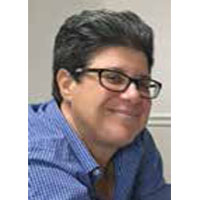
By Michele Karlsberg–
Michele Karlsberg: This month I invited Reginald Harris—author, activist, and Africanist raised in Brooklyn—to interview Cary Alan Johnson, who is currently living in Central Africa, about Johnson’s debut novel, Desire Lines. In Desire Lines, a Black teenager growing up gay in Brooklyn is captivated by a vision of life on the other side of the river, where the sparkle and glitter of Manhattan beckon. Coming into adulthood, he finds himself living in a five-floor walk-up in Hell’s Kitchen just as the AIDS epidemic is hitting the city. We follow him and his group of friends as they experience the first wave of illness and death, and then accompany him on a two-year journey to Zaire, Central Africa, where he must confront corruption and homophobia in new and unexpected ways.

Reginald Harris: Tell me about the genesis of your book. What led you to write Desire Lines?
Cary Alan Johnson: It took me ten years to write it. I’d worked on several essays and shorter pieces over the last fifteen years, some of them about the AIDS crisis and the response of the Black gay community and Black gay men’s survival strategies. I started out writing a series of essays but that felt too preachy. I worked on a memoir for a while, then said no, I’m not that interesting; there’s nothing linear about my experience. There was not the rise and fall that I think even a memoir has to have.
Then I said, you know what, you need to do this thing that you want to do. You need to write the full-length, fully-articulated story of that experience. Not that there’s one experience; there are many stories. But in the story I wrote, I tried to pull in enough diversity of characters that there’s a little bit for everyone who lived through that period to find themselves. So, I said, “Let me take the journey and write a novel, and make up people and make up their stories.” Amalgamate some characters, like Regina. She’s a perfect example, [because] she’s an amalgam of a number of women who were part of my life, who played critical roles in my life. And I think for many gay men, we often have these primary relationships with one woman, often a straight woman, and I thought those relationships were so critical and risky and important that they needed to have some exploration.
Reginald Harris: Desire Lines also deals very vividly with addiction.
Cary Alan Johnson: I felt there had been some pretty good books about cocaine and crack addiction. Crack to me was an experience—plenty of white people smoked crack—but it was really an experience of the African-American community. It was marketed to us, we accepted it wholeheartedly, and it destroyed lives and families and futures and careers. And almost destroyed mine personally. So, I felt that story also needed to be told. Maybe I needed to unearth it for myself as a person and put it on paper, and expel some of the shame around it and talk about the awfulness of it, the truth and the awfulness of it, for other people that may have gone through it, or those who had friends and family that went through it, which most of us didn’t.
What I’m realizing is that I wrote Desire Lines to heal. Many of us who were coming of age in the 1980s—we came out of that era damaged as f–k, hurting. And all you could do—maybe some people were smarter about themselves—but all you could do was stuff it down, stuff it down. You couldn’t go crazy. You couldn’t run out into the streets screaming. You had to just keep showing up for your friends, for your people who were dying, for yourself. Keep showing up.
I remember that, before the test for seroprevalence came out, it was a total question mark. And, for many of us, it was not a question mark; it was pretty much a fait accompli: I’m seeing people dying, so what possible hope could I have that I’m gonna survive into my thirties? But still, you have to show up. And some of us didn’t. Some of us went off the deep end. But we were the best and the brightest. Many of us were the first generation of Black boys to go off to college, the first generation that could kind of be “out,” or at least not hiding their sexuality. That’s why that scene in the novel in the Paradise Garage is so important to me. The narrator and a thousand other men are in this arena and they’re like, “This is our moment. We’re young, gifted, and Black—and queer. And what could possibly stop us? What could possibly stop us? And … guess what?
For more information: https://www.caryalanjohnson.com
Reginald Harris, a writer and poet based in Brooklyn, is the author of “Ten Tongues” (2003) and “Autogeography” (2013).
Michele Karlsberg Marketing and Management specializes in publicity for the LGBTQ+ community. This year, Karlsberg celebrates 33 years of successful marketing campaigns. For more information: https://www.michelekarlsberg.com
Words
Published on November 17, 2022
Recent Comments